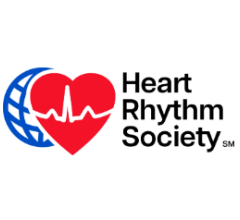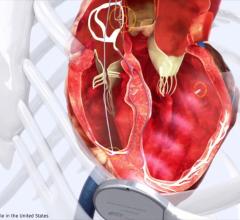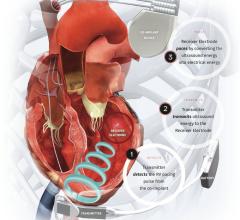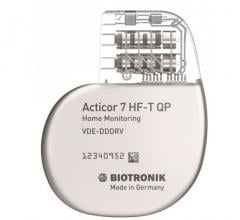April 2, 2009 - The 24-month findings from the REVERSE (Resynchronization Reverse Remodeling in Systolic Left Ventricular Dysfunction) trial, sponsored by Medtronic Inc. and presented at ACC, shows cardiac resynchronization therapy (CRT) may improve clinical outcomes in asymptomatic or mildly symptomatic heart failure patients, and clinical results revealed a 62 percent reduction in the risk of first heart failure hospitalization or death.
Currently, CRT is not approved for use in mildly symptomatic or asymptomatic patients who were shown to benefit from CRT in this trial.
Key findings of the trial include:
- A 62 percent reduction in the risk of death or heart failure hospitalization between patients with CRT turned on and CRT turned off (p=0.003) was observed
- Far fewer patients – 19 percent – of those treated with CRT had worsened at 24 months, compared with 34 percent who did not receive CRT (p=0.01).
- CRT leads to a reduction in heart size, as measured by cardiac ultrasound, improving its function and helping the heart pump more efficiently.
“The data demonstrate that even for patients who have mild or no heart failure symptoms, CRT may have a positive impact on clinical outcomes,” said Jean-Claude Daubert, M.D., FACC, department of cardiology, Centre Hospitalier Universitaire, Rennes, France. “Preventing the progression of heart failure with device therapy may also delay the time to first hospitalization or death, thus not only helping improve patients’ lives, but ultimately reducing the economic burden of heart failure to the health system.”
With 610 patients studied, REVERSE is the first large-scale, global, randomized, double-blind trial to demonstrate the benefits of CRT in mild heart failure patients or asymptomatic patients who previously had heart failure symptoms. These latest results represent findings at 24 months for the European blinded cohort of 262 patients. As previously reported, the trial trended toward, but did not meet statistical significance for its primary endpoint (percent of patients worsened at 12 months using a heart failure clinical composite score), with more patients in the trial improved with CRT. This benefit was confirmed and was statistically significant with the 24-month results.
For more information: www.medtronic.com
News | April 02, 2009


 July 21, 2025
July 21, 2025 









